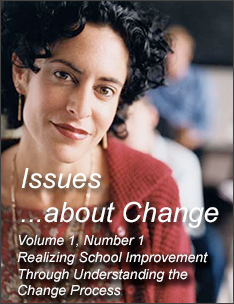References and Credits
- Astuto, T.A., Clark, D.L., Read, A-M., McGree, K. & Fernandez, L. deK.P. (1993). Challenges to dominant assumptions controlling educational reform. Andover, Massachusetts: Regional Laboratory for the Educational Improvement of the Northeast and Islands.
- Boyd, V. (1992). School context. Bridge or barrier to change? Austin, Texas: Southwest Educational Development Laboratory.
- Boyd, V. & Hord, S.M. (1994). Principals and the new paradigm: Schools as learning communities. Paper presented at the annual meeting of the American Educational Research Association, New Orleans.
- Brandt, R. (1995, November). On restructuring schools: A conversation with Fred Newmann. Educational Leadership, 53(3), 70-73.
- Carmichael, L. (1982, October). Leaders as learners: A possible dream. Educational Leadership, 40(1), 58-59.
- Darling-Hammond, L. (1994, November). The current status of teaching and teacher development in the United States. New York: Teachers College, Columbia University.
- Darling-Hammond, L. (1996, March). The quiet revolution: Rethinking teacher development. Educational Leadership, 53(6), 4-10.
- Fawcett, G. (1996, Winter). Moving another big desk. Journal of Staff Development, 17(1), 34-36.
- Hoerr, T.R. (1996, January). Collegiality: A new way to define instructional leadership. Phi Delta Kappan, 77(5), 380-381.
- Hord, S.M. (1997). Professional learning communities: Communities of continuous inquiry and improvement. Austin: Southwest Educational Development Laboratory.
- Isaacson, N. & Bamburg, J. (1992, November). Can schools become learning organizations? Educational Leadership, 50(3), 42-44.
- Kleine-Kracht, P.A. (1993, July). The principal in a community of learning. Journal of School Leadership, 3(4), 391-399.
- Louis, K.S. & Kruse, S.D. (1995). Professionalism and community: Perspectives on reforming urban schools. Thousand Oaks, California: Corwin Press.
- McLaughlin, M.W. & Talbert, J.E. (1993). Contexts that matter for teaching and learning. Stanford, California: Center for Research on the Context of Secondary School Teaching, Stanford University.
- Midgley, C. & Wood, S. (1993, November). Beyond site-based management: Empowering teachers to reform schools. Phi Delta Kappan, 75(3), 245-252.
- O'Neil, J. (1995, April). On schools as learning organizations: A conversation with Peter Senge. Educational Leadership, 52(7), 20-23. Prestine, N.A. (1993, July). Extending the essential schools metaphor: Principal as enabler. Journal of School Leadership, 3(4), 356-379.
- Rosenholtz, S. (1989). Teacher's workplace: The social organization of schools. New York: Longman.
- Senge, P. (1990). The fifth discipline: The art and practice of the learning organization. New York: Currency Doubleday.
- Sergiovanni, T.J. (1994a). Building community in schools. San Francisco: Jossey-Bass Publishers.
- Sergiovanni, T.J. (1994b, May). Organizations or communities? Changing the metaphor changes the theory. Educational Administration Quarterly, 30(2), 214-226.
- Sergiovanni, T.J. (1996). Leadership for the schoolhouse. San Francisco: Jossey-Bass Publishers.
- Snyder, K.J., Acker-Hocevar, M. & Snyder, K.M. (1996, Winter). Principals speak out on changing school work cultures. Journal of Staff Development, 17(1), 14-19.
- Spears, J.D. & Oliver, J.P. (1996). Rural school reform: Creating a community of learners. Paper presented at the annual meeting of the American Education Research Association, New York City.
- Sykes, G. (1996, March). Reform of and as professional development. Phi Delta Kappan, 77(7), 465-476.
- Watts, G.D. & Castle, S. (1993, December). The time dilemma in school restructuring. Phi Delta Kappan, 75(3), 306-310. Whyte, D. (1994). The heart aroused: Poetry and the preservation of the soul in corporate America. New York: Currency Doubleday.
- Wignall, R. (1992, June). Building a collaborative school culture: A case study of one woman in the principalship. Paper presented at the European Conference on Educational Research, Enschede, The Netherlands.
Credits and Disclaimers
Issues . . . about Change is published and produced quarterly Southwest Educational Development Laboratory (SEDL). This publication is based on work sponsored by the Office of Educational Research & Improvement, U.S. Department of Education under grant number RJ96006801. The content herein does not necessarily reflect the views of the department or any other agency of the U.S. government or any other source. Available in alternative formats.
SEDL is located at 4700 Mueller Blvd., Austin, Texas 78723; 512-476-6861. SEDL is an Equal Employment Opportunity/Affirmative Action Employer and is committed to affording equal employment opportunities to all individuals in all employment matters.
This issue was written by Shirley M. Hord, SEDL.

